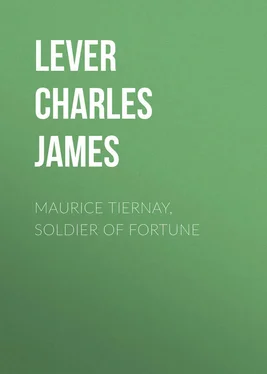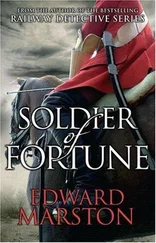Charles Lever - Maurice Tiernay, Soldier of Fortune
Здесь есть возможность читать онлайн «Charles Lever - Maurice Tiernay, Soldier of Fortune» — ознакомительный отрывок электронной книги совершенно бесплатно, а после прочтения отрывка купить полную версию. В некоторых случаях можно слушать аудио, скачать через торрент в формате fb2 и присутствует краткое содержание. Жанр: literature_19, foreign_antique, foreign_prose, на английском языке. Описание произведения, (предисловие) а так же отзывы посетителей доступны на портале библиотеки ЛибКат.
- Название:Maurice Tiernay, Soldier of Fortune
- Автор:
- Жанр:
- Год:неизвестен
- ISBN:нет данных
- Рейтинг книги:3 / 5. Голосов: 1
-
Избранное:Добавить в избранное
- Отзывы:
-
Ваша оценка:
- 60
- 1
- 2
- 3
- 4
- 5
Maurice Tiernay, Soldier of Fortune: краткое содержание, описание и аннотация
Предлагаем к чтению аннотацию, описание, краткое содержание или предисловие (зависит от того, что написал сам автор книги «Maurice Tiernay, Soldier of Fortune»). Если вы не нашли необходимую информацию о книге — напишите в комментариях, мы постараемся отыскать её.
Maurice Tiernay, Soldier of Fortune — читать онлайн ознакомительный отрывок
Ниже представлен текст книги, разбитый по страницам. Система сохранения места последней прочитанной страницы, позволяет с удобством читать онлайн бесплатно книгу «Maurice Tiernay, Soldier of Fortune», без необходимости каждый раз заново искать на чём Вы остановились. Поставьте закладку, и сможете в любой момент перейти на страницу, на которой закончили чтение.
Интервал:
Закладка:
Charles James Lever
Maurice Tiernay, Soldier of Fortune
NOTICE
The strangeness of some of the incidents, and the rapidity with which events so remarkable succeeded each other, almost deterred the writer from ever committing them to the press; nor was it till after much consultation, and some persuasive influence on the part of friends, that he at length yielded and decided upon so doing. Whether in that determination his choice was a wise one, must be left to the judgment of the reader; for himself, he has but to say that to ponder over some of these early scenes, and turn over, in thought, some of his youthful passages, has solaced many a weary hour of an age when men make few new friendships, and have almost as few opportunities to cultivate old ones.
That the chief events related in these pages – such, for instance, as every detail of the French invasion, the capture of Wolfe Tone, and the attack on Monte di Faccio – are described with rigid exactness, the writer is most sincere in the expression of his conviction. For the truth of incident purely personal, it is needless to press any claim, seeing that the hero owns no higher name than that of – A Soldier of Fortune.
CHAPTER I. ‘THE DAYS OF THE GUILLOTINE’
Neither the tastes nor the temper of the age we live in are such as to induce any man to boast of his family nobility. We see too many preparations around us for laying down new foundations, to think it a suitable occasion for alluding to the ancient edifice. I will, therefore, confine myself to saying, that I am not to be regarded as a mere pretender because my name is not chronicled by Burke or Debrett. My great-grandfather, after whom I am called, served on the personal staff of King James at the Battle of the Boyne, and was one of the few who accompanied the monarch on his flight from the field, for which act of devotion he was created a peer of Ireland, by the style and title of Timmahoo – Lord Tiernay, of Timmahoo the family called it – and a very rich-sounding and pleasant designation has it always seemed to me.
The events of the time, the scanty intervals of leisure enjoyed by the king, and other matters, prevented a due registry of my ancestors’ claims; and, in fact, when more peaceable days succeeded, it was judged prudent to say nothing about a matter which might revive unhappy recollections, and open old scores, seeing that there was now another king on the throne ‘who knew not Joseph’; and so, for this reason and many others, my greatgrandfather went back to his old appellation of Maurice Tiernay, and was only a lord among his intimate friends and cronies of the neighbourhood.
That I am simply recording a matter of fact, the patent of my ancestors’ nobility, now in my possession, will sufficiently attest: nor is its existence the less conclusive, that it is inscribed on the back of his commission as a captain in the Shanabogue Fencibles – the well-known ‘Clear-the-way-boy s’ – a proud title, it is said, to which they imparted a new reading at the memorable battle aforementioned.
The document bears the address of a small public-house called the ‘Nest,’ on the Kells road, and contains in one corner a somewhat lengthy score for potables, suggesting the notion that his Majesty sympathised with vulgar infirmities, and found, as the old song says, ‘that grief and sorrow are dry.’
The prudence which for some years sealed my greatgrandfather’s lips, lapsed, after a time, into a careless and even boastful spirit, in which he would allude to his rank in the peerage, the place he ought to be holding, and so on: till at last, some of the Government people, doubtless taking a liking to the snug house and demesne of Timmahoo, denounced him as a rebel, on which he was arrested and thrown into gaol, where he lingered for many years, and only came out at last to find his estate confiscated, and himself a beggar.
There was a small gathering of Jacobites in one of the towns of Flanders, and thither he repaired; but how he lived, or how he died, I never learned. I only know that his son wandered away to the east of Europe, and took service in what was called Trenck’s Pandours – as jolly a set of robbers as ever stalked the map of Europe, from one side to the other. This was my grandfather, whose name is mentioned in various chronicles of that estimable corps, and who was hanged at Prague afterwards, for an attempt to carry off an archduchess of the empire, to whom, by the way, there is good reason to believe he was privately married. This suspicion was strengthened by the fact that his infant child, Joseph, was at once adopted by the imperial family, and placed as a pupil in the great military school of Vienna. From thence he obtained a commission in the Maria Theresa Hussars, and subsequently, being sent on a private mission to France, entered the service of Louis xvi., where he married a lady of the Queen’s household – a Mademoiselle de la Lasterie – of high rank and some fortune; and with whom he lived happily till the dreadful events of 17 – , when she lost her life, beside my father, then fighting as a Garde du Corps, on the staircase at Versailles. How he himself escaped on that day, and what were the next features in his history, I never knew; but when again we heard of him, he was married to the widow of a celebrated orator of the Mountain, and he himself an intimate friend of St. Just and Marat, and all the most violent of the Republicans.
My father’s history about this period is involved in such obscurity, and his second marriage followed so rapidly on the death of his first wife, that, strange as it may seem, I never knew which of the two was my mother – the lineal descendant of a house, noble before the Crusades, or – the humble bourgeoise of the Quartier St. Denis. What peculiar line of political action my father followed I am unable to say, nor whether he was suspected with or without due cause; but suspected he certainly was, and at a time when suspicion was all-sufficient for conviction. He was arrested, and thrown into the Temple, where I remember I used to visit him every week; and whence I accompanied him one morning, as he was led forth with a string of others to the Place de Grève, to be guillotined. I believe he was accused of royalism; and I know that a white cockade was found among his effects, and in mockery was fastened on his shoulder on the day of his execution. This emblem, deep dyed with blood, and still dripping, was taken up by a bystander, and pinned on my cap, with the savage observation, ‘Voilà, it is the proper colour; see that you profit by the way it became so.’ As, with a bursting heart, and a head wild with terror, I turned to find my way homeward, I felt my hand grasped by another – I looked up, and saw an old man, whose threadbare black clothes and emaciated appearance bespoke the priest in the times of the Convention.
‘You have no home now, my poor boy,’ said he to me; ‘come and share mine.’
I did not ask him why. I seemed to have suddenly become reckless as to everything present or future. The terrible scene I had witnessed had dried up all the springs of my youthful heart; and, infant as I was, I was already a sceptic as to everything good or generous in human nature. I followed him, therefore, without a word, and we walked on, leaving the thoroughfares and seeking the less frequented streets, till we arrived in what seemed a suburban part of Paris – at least the houses were surrounded with trees and shrubs; and at a distance I could see the hill of Montmartre and its windmills – objects well known to me by many a Sunday visit.
Even after my own home, the poverty of the Père Michel’s household was most remarkable: he had but one small room, of which a miserable settle-bed, two chairs, and a table constituted all the furniture; there was no fireplace, a little pan for charcoal supplying the only means for warmth or cookery; a crucifix and a few coloured prints of saints decorated the whitewashed walls; and, with a string of wooden beads, a cloth skull-cap, and a bracket with two or three books, made up the whole inventory of his possessions; and yet, as he closed the door behind him, and drew me towards him to kiss my cheek, the tears glistened in his eyes with gratitude as he said —
Читать дальшеИнтервал:
Закладка:
Похожие книги на «Maurice Tiernay, Soldier of Fortune»
Представляем Вашему вниманию похожие книги на «Maurice Tiernay, Soldier of Fortune» списком для выбора. Мы отобрали схожую по названию и смыслу литературу в надежде предоставить читателям больше вариантов отыскать новые, интересные, ещё непрочитанные произведения.
Обсуждение, отзывы о книге «Maurice Tiernay, Soldier of Fortune» и просто собственные мнения читателей. Оставьте ваши комментарии, напишите, что Вы думаете о произведении, его смысле или главных героях. Укажите что конкретно понравилось, а что нет, и почему Вы так считаете.












